- Home
- Richard Powers
Generosity: An Enhancement
Generosity: An Enhancement Read online
ALSO BY RICHARD POWERS
Three Farmers on Their Way to a Dance
Prisoner’s Dilemma
The Gold Bug Variations
Operation Wandering Soul
Galatea 2.2
Gain
Plowing the Dark
The Time of Our Singing
The Echo Maker
GENEROSITY
GENEROSITY
AN ENHANCEMENT
RICHARD POWERS
A FRANCES COADY BOOK
FARRAR, STRAUS AND GIROUX NEW YORK
Farrar, Straus and Giroux
18 West 18th Street, New York 10011
Copyright © 2009 by Richard Powers
All rights reserved
Distributed in Canada by Douglas & McIntyre Ltd.
Printed in the United States of America
First edition, 2009
A portion of this work was published in slightly different form in A Public Space.
What “the scientist says,” on page 295, is a paraphrase from Antonio Damasio’s Looking for Spinoza.
Grateful acknowledgment is made for permission to reprint the following previously published material: Excerpts from Exuberance, by Kay Redfield Jamison, and A History of the World in 10½ Chapters, by Julian Barnes, both courtesy of Alfred A. Knopf / Random House, Inc.
Library of Congress Cataloging-in-Publication Data
Powers, Richard, 1957–
Generosity : an enhancement / Richard Powers.—1st ed.
p. cm.
ISBN: 978-0-374-16114-9 (alk. paper)
1. College teachers—Fiction. 2. Genetics—Research—Fiction. I. Title.
PS3566.O92 G46 2009
813'.54—dc22
2008054249
Designed by Jonathan D. Lippincott
www.fsgbooks.com
10 9 8 7 6 5 4 3 2 1
For JTK—
La vraie générosité envers l’avenir consiste à tout donner au présent.
—Camus
PART ONE
OF STRANGE LANDS AND PEOPLE
Exuberance carries us places we would not otherwise go—across the savannah, to the moon, into the imagination—and if we ourselves are not so exuberant we will, caught up by the contagious joy of those who are, be inclined collectively to go yonder.
—Kay Redfield Jamison, Exuberance
A man rides backward in a packed subway car. This must be almost fall, the season of revision. I picture him in the thick of bequest, tunneling beneath the I Will City, the world’s twenty-fifth biggest urban sprawl, one wedged in the population charts between Tianjin and Lima. He hums some calming mantra to himself, a song with the name Chicago in it, but the train drowns out the tune.
He’s just thirty-two, I know, although he seems much older. I can’t see him well, at first. But that’s my fault, not his. I’m years away, in another country, and the El car is so full tonight that everyone’s near invisible.
Look again: the whole point of heading out anywhere tonight. The blank page is patient, and meaning can wait. I watch until he solidifies. He cowers in the scoop seat, knees tight and elbows hauled in. He’s dressed for being overlooked, in rust jeans, maroon work shirt, and blue windbreaker with broken zipper: the camouflage of the non-aligned, circa last year. He’s as white as anyone on this subway gets. His own height surprises him. His partless hair waits for a reprimand and his eyes halt midway between hazel and brown. His face is about six centuries out of date. He would make a great Franciscan novice in one of those mysteries set in a medieval monastery.
He cups a bag of ratty books on his lap. No; look harder: a ruggedized plastic sack inscribed with bright harvest cornucopia that issues the trademarked slogan, Total Satisfaction . . . plus so much more!
His spine curls in subway contrition, and his shoulders apologize for taking up any public space at all. His chin tests the air for the inevitable attack that might come from any direction. I’d say he’s headed to his next last chance. He tries to give his seat to a young Latina in a nurse’s uniform. She just smirks and waves him back down.
Early evening, four dozen feet below the City on the Make: every minute, the train tunnels underneath more humans than would fit in a fundamentalist’s heaven. Aboveground, it must be rainy and already dark. The train stops and more homebound workers press in, trickling September drizzle. This is the fifth year since the number of people living in cities outstripped those who don’t.
I watch him balance a yellow legal pad on his toppling book sack. He checks through the pages, curling each back over the top of the pad. The sheets fill with blocks of trim handwriting. Red and green arrows, nervous maneuvers and counter-maneuvers, swarm over the text.
A forest of straphangers hems him in. Many are wired for sound. A damp man next to him drips on his shoes. Humanity engulfs him: phone receptionists for Big Four accounting firms. Board of Trade pit bulls, burned out by twenty-eight. Market researchers who’ve spent days polling focus groups on the next generation of portable deionizers. Purveyors and contractors, drug dealers, number crunchers, busboys, grant writers. Just brushing against them in memory makes me panic.
Advertisements crown the car’s walls: Outpsych your tyke. Want to know what makes the planet tick? Make your life just a little perfecter. Every few minutes, a voice calls over the speakers: “If you observe any suspicious behavior or unattended packages . . .”
I force my eyes back down over the scribbler’s left shoulder, spying on his notes. The secret of all imagination: theft. I stare at his yellow legal pages until they resolve. They’re full of lesson plans.
I know this man. He’s been fished from the city’s adjunct-teacher pool, an eleventh-hour hire, still working on his first night’s class even as the train barrels toward his South Loop station. The evidence is as clear as his all-caps printing: ethics has wrecked his life, and this fluke part-time night job is his last hope for rehabilitation. He never expected to land such a plum again. Death and resurrection: I know this story, like I wrote it myself.
The train wags, he pitches in his seat, and I don’t know anything. I stop deciding and return to looking. A heading on the top of his pad’s first page reads: Creative Nonfiction 14, Sect. RS: Journal and Journey.
A heavy teen in a flak jacket bumps him. He squeezes out a retreating smile. Then he resumes drawing red arrows, even now, two subway stops from his first night’s class. As I always say: It’s never too late to overprepare. His pen freezes in midair; he looks up. I glance away, caught spying. But his hand just hovers. When I look back, he’s the one who’s spying on someone else.
He’s watching a dark-haired boy across the aisle, a boy with a secret quickening in his hands. Something yellow floats on the back of the boy’s curled fist. His two knuckles pin a goldfinch by the ankles. The boy quiets the bird, caressing in a foreign tongue.
My adjunct’s hand holds still, afraid that his smallest motion will scatter this scene. The boy sees him looking, and he hurries the bird back into a bamboo cylinder. My spy flushes crimson and returns to his notes.
I watch him shuffle pages, searching for a passage in green highlighter that reads First Assignment. The words have been well worked over. He strikes them out once more and writes: Find one thing in the last day worth telling a total stranger.
Clearly he’s terrified there may be no such thing. I see it in his spine: he’ll bother no one with his day’s prize, least of all a total stranger.
It’s up to me to write his assignment for him. To describe the thing that this day will bring, the one that will turn life stranger than total.
He gets out at Roosevelt, the Wabash side. He struggles up the stairs against the evening human waterfall. Remnants of the day shi
ft still pour underground, keen on getting home tonight at a reasonable hour. Home before the early autumn rains wash away their subdivision. Home before Nikkei derivatives trigger a Frankfurt DAX panic. Before a rogue state sails a quick-breeding bioweapon through the St. Lawrence Seaway into Lake Michigan.
At street level, my adjunct is hit by the downtown’s stagecraft. The granite gorges, the glass towers with their semaphores of light he’s too close to read. To the northeast, the skyline mounts up in stunning ziggurats. His heart pumps at the blazing panorama, as it did when he was a boy gazing at World’s Fair futures he would inhabit, any year now. Someone in the crowd clips his back, and he moves on.
Down a canyon to the east, he glimpses a sliver of lakefront: the strip of perfected coast that passes for Chicago. He has stood on the steps of the fabulous nineteenth-century Palace of Taxidermy and gazed north up the sheer city face—the boats in the marina, the emerald park, the epic cliff of skyscrapers curling into the two blues—and felt, despite everything, this place pushing toward something sublime.
Off to his left, dumpsters the size of sperm whales swarm a block-long abyss, each overflowing with last century’s smashed masonry. One more angel giant rises from the pit, its girders taking on a sapphire skin. Luxury skybox living: late throes of a South Loop renaissance. Last year’s homeless are all hidden away in shelters on the city’s perimeter. Chicago hasn’t looked better since the fire. The place is after something, a finish line beyond any inhabitant’s ability to see, let alone afford.
He wants to fetch his legal pad from his sack and make some notes. Rule one: Get it down before it goes. He’d like to get this down—something about the furnace of renewal, the fall and rise of any given block on the way to this city’s obscure goal. But he keeps to the stream of rush-hour foot traffic, afraid of getting arrested for suspicious activity. He pulls up at the entrance of Mesquakie College of Art, a steel-framed limestone temple from back in the age when skyscrapers topped out at a dozen stories.
No, you’re right: those streets don’t really run that way. That neighborhood is a little off. The college isn’t quite there; it’s not that college.
This place is some other Second City. This Chicago is Chicago’s in vitro daughter, genetically modified for more flexibility. And these words are not journalism. Only journey.
His name is Russell Stone, or so he tells the security guard in the Mesquakie lobby. The guard asks to see a college ID; Russell Stone has none. He tries to explain his last-minute hiring. The guard can’t find Russell on a printout. He makes several calls, repeating the name with increasing suspicion until Russell Stone is ready to apologize for believing that the job might ever have been his.
At last the guard hangs up. He explains with simple scorn that Stone missed the cutoff date. Against his better judgment, he issues Stone a security badge, shaking his head all the while.
By the time Russell finds his room, his eight students are already encamped around its oval table, deep in a dozen discussions. He grasps at once how badly he has mis-prepped. He fingers his carefully selected textbook through the thick plastic sack—Frederick P. Harmon’s Make Your Writing Come Alive. Too late, he sees: the book’s a ridiculous blunder. This group will mock it into the hereafter.
I should feel sorry for the man. But what in the name of second chances was he thinking?
In the doorway, he tries a feeble smile; no one looks up. He makes his way, head bobbing, to the gap in the student oval. To hide his shaking hands and call the group to attention, he dumps the sack out on the table. He lifts up Harmon, cocks an eyebrow at the group. The copy in his hands flaps open to a highlighted page:
Convincing characters perform differently for different audiences, in different flavors of crisis. We know them by their changing strategies, often better than they know themselves.
“Everyone find a copy?”
No one says anything.
“Right. Ahhh . . .” He flips through his legal pad. “Let’s . . . see . . . Don’t tell me!” One or two students chuckle deniably. “Oh, yeah. Roll call. How about a name, biographical tidbit, and life philosophy? I’ll start. Russell Stone. By day, mild-mannered editor with a local magazine. Life philosophy . . .”
For convenience, I give him mine.
“When you’re sure of what you’re looking at, look harder.”
He glances at the woman to his left, all purple and steel. “So who are you, when you’re not at home?”
I wish I could make out Stone’s students better. I can see how they disturb him. But I just can’t see them in any detail. They’re hiding in the sullen, shiny performance of youth.
The circle starts with Sue Weston, a small, hard woman who must run with both wolves and scissors. She has recently been pierced in all her few soft spots. She looks at the world slant, from underneath a lopsided pageboy she cuts herself. Public judgment excites her so much it’s scary. She gives her life philosophy: “The shittiest five-second advertising jingle is superior to any symphony, if more people hum it.”
A big, bleached, omnivorous woman to Sue’s right barrels her way through the ritual intro. Charlotte Hullinger has lived at thirteen addresses in twenty-two years. Dozens of sketches on rag paper tumble out of her overstuffed backpack. The left side of her mouth pulls back in permanent skepticism. She scares me, shrugging off her credo: “I’ll try anything once. Twice, if it’s nice.”
Cowboys crawl across Adam Tovar’s shirt and zoo animals parade around his baggy trousers. It’s his universal outfit, from rooftop croquet games to his forebears’ funerals. He says, “My great-grandfather was a miner so that my grandfather could be an engineer so that my father could be a poet so that I could be a goofball.” The others give him the laugh that’s all he really wants in life. He tells of being on a cruise ship last summer that was taken over by Somali pirates, one of whom he’s still in e-mail touch with. “The only thing I know for sure is you can never be too misinformed.”
Roberto Muñoz—long, gaunt, head shaved, and haunted—never stops checking the exit. He should see a doctor about those skin lesions. I picture his parents walking into the country across the Chihuahuan desert, at night, though that’s my own clichéd noise. For the last four years, painting has kept him off crystal meth. “Play the hand you’re dealt,” he insists. “Everybody’s got to play their own deal.”
The cowering figure next to Roberto whispers, “Kiyoshi Sims.” He disappears behind the bridge of his black glasses, as if the group will forget him if he holds still long enough. Machines are his people; among them, he’s widely and well loved. He could make $100 million by accident on a world-changing digital patent and not be able to figure out how to buy a condo with it. “I’m not sure about life philosophy,” he stammers. “I haven’t given it much thought.”
“Mason Mason,” Mason Mason announces. Worked briefly loading luggage at O’Hare, until they discovered he’d lied on his application. Worked briefly as a youth counselor, until someone heard what he was counseling the youth. He scratches his ear and announces, “More people probably want you dead than want you alive.”
Next to last comes John Thornell, a massive, impassive monolith. People bother him less than snow bothers a mountain. He tells the class about his current project, a series of 365 pen-and-ink drawings, each one meticulously re-creating a different product logo he uses in daily life. His philosophy comes out robotic: “The supreme human emotion has to be boredom.”
Stone’s students perform themselves, each a work in progress. Their eyes fill with the designs they’ll draw, the clips they’ll shoot, the hypermedia they’ll conjure. Russell Stone remembers them all from ten years ago, when he was one of them. He already pities their descent into noncreative nonfiction.
Introductions come full circle, to the slight, short, ethnically ambiguous woman to his left. She’s clothed in bleach-streaked jeans and a canary tunic, silver bracelets up both auburn forearms, and a scarf in bright Mediterranean spirals over her shoulders. H
er curly, dark hair is pulled back in a profuse ponytail. She waits her turn in a blush of listening.
She, I can see in detail.
“Let me guess,” Russell Stone says. “Amzwar?” The last name remaining on his list.
She smiles at his foolishness. “Yes! Amzwar. Thassadit Amzwar.” Her accent is unplaceable. She says she’s a Berber Algerian, from Kabylie, via Algiers, via Paris, via Montreal. Her eyes are claret. She sits inside her nimbus, chatting with ease. He thinks he hears her say she fled from the Algerian civil war. He wants to ask her to repeat herself. Instead he panics and prompts her for her life philosophy.
“Life is too good for philosophies,” she tells them. “I try my best to decide no more than God.”
My eyes adjust: dark, cracked linoleum and broken-sashed windows. Fluorescent lights humming like a prop plane hang low over a circle of students filled with that first-day mix of nerves and thrill, as if anything might still happen, even this late in history, even in Chicago.
The first class goes so well it scares Russell Stone. The students pretty much hijack the syllabus. Each of them is starved for fresh. Even the older ones still believe in a destiny sure to reveal itself, any semester now. Three of them admit they’re here because Journal and Journey is the easiest way for visual majors to complete the writing requirement. Words are not the shape their desperation takes; sentences can’t hope to survive the flood of images. But who knows? Even a journal entry might someday become a short video.

 The Overstory
The Overstory Bewilderment
Bewilderment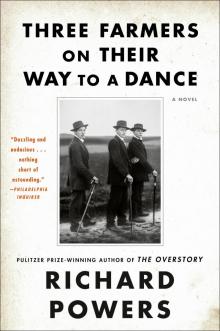 Three Farmers on Their Way to a Dance
Three Farmers on Their Way to a Dance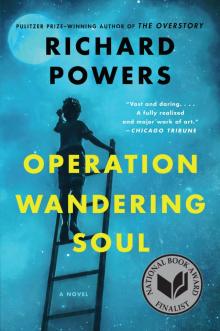 Operation Wandering Soul
Operation Wandering Soul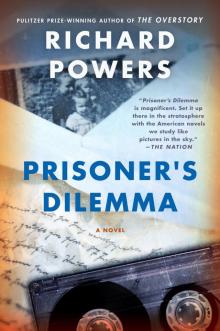 Prisoner's Dilemma
Prisoner's Dilemma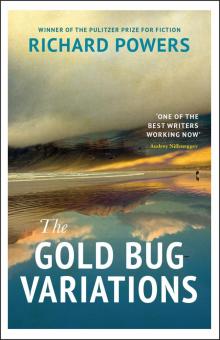 The Gold Bug Variations
The Gold Bug Variations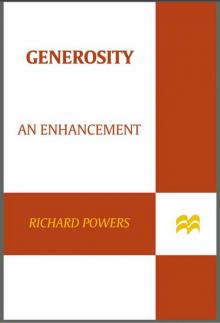 Generosity: An Enhancement
Generosity: An Enhancement The Echo Maker
The Echo Maker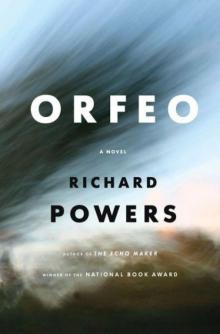 Orfeo
Orfeo The Time of Our Singing
The Time of Our Singing PLOWING THE DARK
PLOWING THE DARK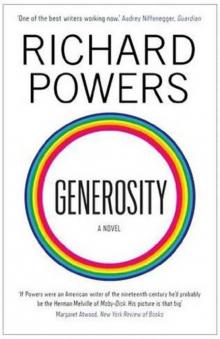 Generosity
Generosity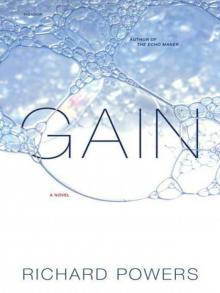 Gain
Gain